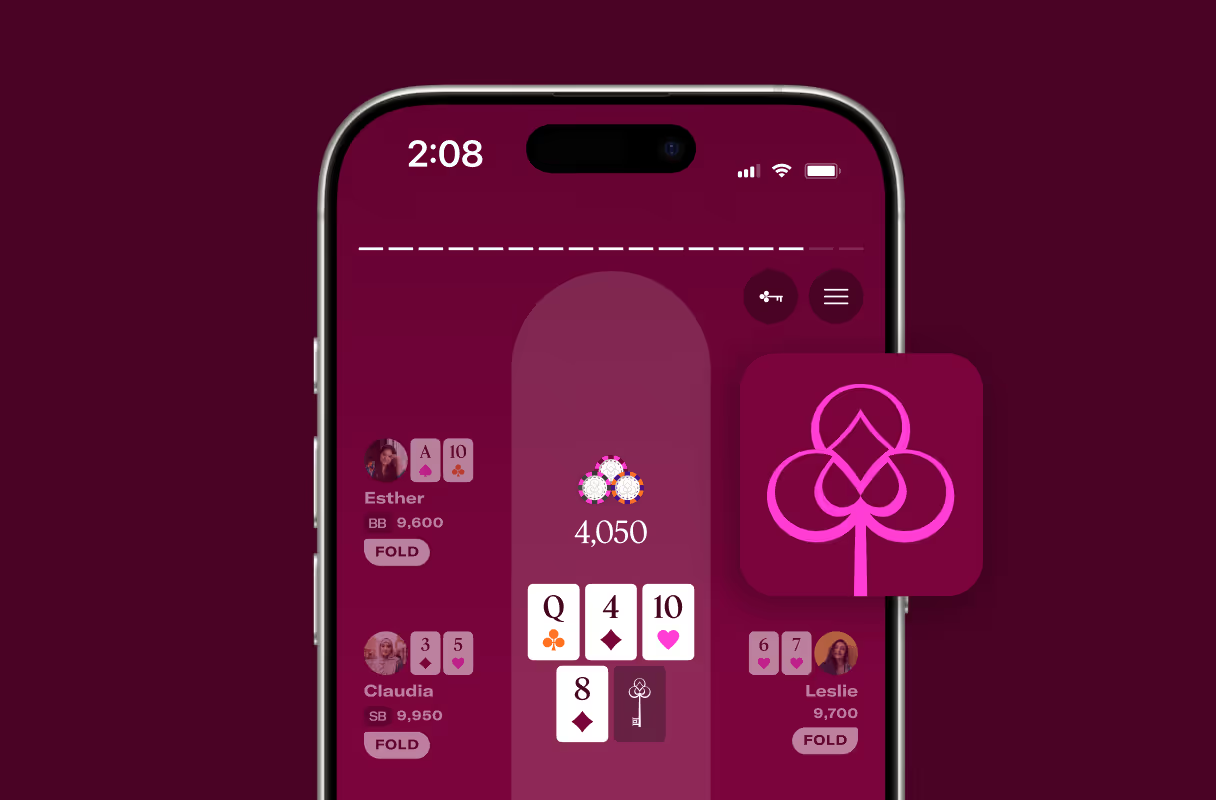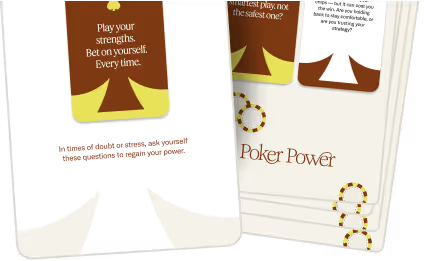Poker. It’s more than cigar smoke and big egos. It’s a way for women to hone human skills and build hard skills.
Don’t believe us? We’ll show you. Here’s a preview of what you learn in your first Poker Power lesson, and how those lessons can help you at any table in life.
Learn the lingo
In poker, there’s a lot of lingo. Luckily, a lot of the basics have entered our everyday language.
How many of these terms do you already know?
- Fold: Give up your cards
- Check: Pass the action to the next player
- Bet: Put chips into the pot, requiring your opponents to do the same if they want to stay in the hand
- Call: Match someone else’s bet
- Raise: Increase the price of the bet
Jargon can be a nettlesome barrier to entry in the corporate world. Developing the skill to speak concisely about complex topics will give you a massive advantage in interviews and overall professional polish.
Tell two truths and a lie
We use the well-known game Two Truths and a Lie as an icebreaker. Not only because it helps you get to know your classmates, but it also introduces the concept of making reads in poker.
Many of the physical tells you can use to spot a liar (a wavering voice, soothing motions, and changes in breathing) also apply to catching a bluffer. It’s important to learn what to look for and to control what may give away information.
Being able to catch a bluff, or make one of your own, is a big part of negotiating whether it’s for a job, a salary, a home, or an internship.
Pick up some rules of the game
In Poker Power clubs, we play No- Limit Texas Hold 'em, the most popular form of poker.
We asked a few furry friends to help us explain the rules of the game and some paw ranki...sorry, hand rankings.
Now that you know how the game works, you can start using poker as a vehicle for learning business and life skills to level the playing field in the workforce.
Throughout our collaborative and engaging course, each lesson focuses on one of the following characteristics typical of risk-savvy leaders: Enterprising, Dominant, Perceptive, Disciplined, Calculated, Ambitious, Resilient, Fearless, Visionary, Analytical, and Dynamic.
Choose a strategy
Poker is a game of strategy, and knowing which strategy to use (and when) is a complex subject.
But starting hands are a great place to...well, start.
Generally, we look for two types of hands:
- Hands with strong showdown value, such as face cards and high pairs. These are the hands with the best chance to win when it’s time to show your cards and see who wins (known as the showdown).
- Drawing hands, like low pairs and suited connectors. These can make powerful combinations of straights, flushes, and three of a kind, but are transparently very strong or very weak. This helps us know exactly when to pump chips into a pot and when to escape.
There are other factors that influence which hands you should play, including the number of players left to act, or the number of chips in your stack, but sticking to strong or drawing hands will give you a good start and help you avoid making costly second-best hands.
Practice with hand reading
After learning the rules, it might feel overwhelming to remember if a straight beats a flush, or how to determine which hand wins given a certain set of community cards.
So who wins? It’s the hand on the right (7,8 of spades) The hand on the left is one diamond short of a flush and only has one pair, whereas the hand on the right made two pairs. If that wasn’t automatic for you, don’t worry. We’re all learning together, and this is a space where it’s totally ok to be a beginner.
Working through these scenarios as a group builds confidence through mastery and grows your collaborative skills. Progression in many careers is going to be based on your ability to lead a team. Practice in class while having fun, learning a great game, and meeting new people.
Join us
Today, we have 130+ clubs with members of all ages—from high school to C-level executives.Take your seat at the table and experience the power of poker. Ready to go all-in? Sign up for your free first lesson.
Poker Power is for educational purposes and does not permit gambling in our clubs. No poker experience is required.





